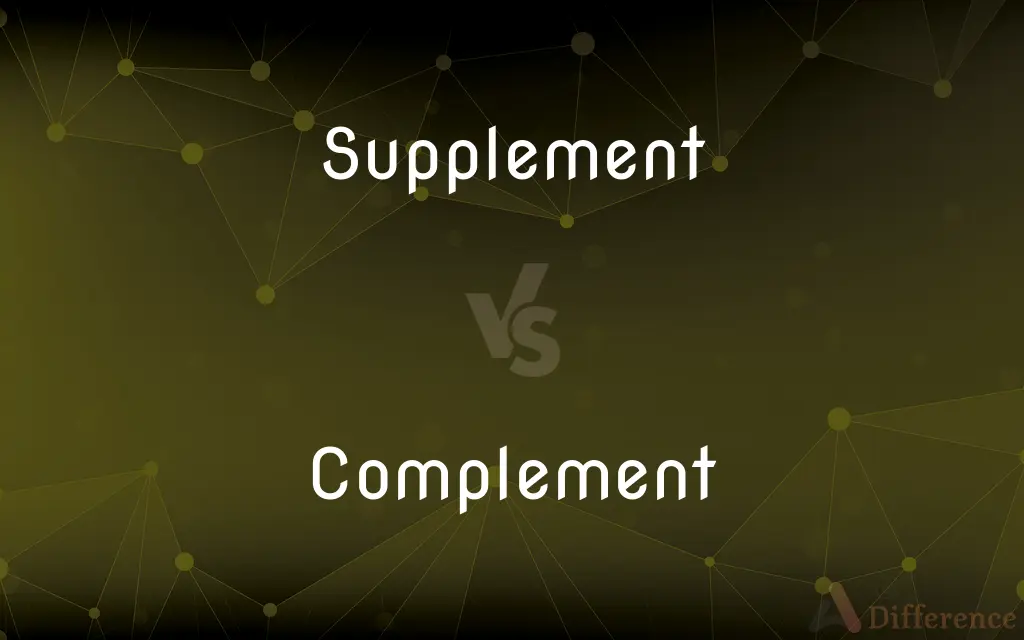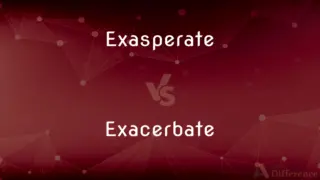Supplement vs. Complement — What's the Difference?
By Tayyaba Rehman — Updated on October 3, 2023
Supplement means to add something extra to enhance, while Complement means something that completes or goes well with something. Both pertain to addition but differ in purpose and completeness.

Difference Between Supplement and Complement
Table of Contents
ADVERTISEMENT
Key Differences
A supplement typically signifies something added to make up for a deficiency or enhance. Conversely, a complement refers to something that completes or goes perfectly with another thing, underscoring wholeness or perfection when combined.
A dietary supplement might add nutritional value that is otherwise missing from a diet. In a contrasting vein, a complementary food pairing, like wine and cheese, offers a delightful blend, demonstrating that each can enhance the other’s qualities harmoniously.
Supplements often imply the addition of something not inherently present, intending to improve or enhance the original. On the other side, complements often exist in harmony with their counterpart, suggesting a balanced and enhancing existence between the two.
In academic contexts, a supplement might provide additional materials to support learning. In contrast, a complement in linguistics, like a complement clause, provides necessary additional information, showcasing how both entities can coexist in various fields.
Utilizing supplements can imply a lack or need that requires addressing. Utilizing complements, however, often suggests a strategic or aesthetic choice to create a balanced, more pleasing whole, indicating divergent implications in usage.
ADVERTISEMENT
Comparison Chart
Purpose
To enhance or add to
To complete or perfect
Implies Deficiency
Yes
No
Functional Relationship
Can work independently
Works in harmony with another
Dependency
Not necessarily dependent
Often dependent on another element
Typical Usage
Additional, extra
Harmonious, completing
Compare with Definitions
Supplement
Supplement can refer to extra nutritional intake.
He takes a vitamin supplement daily.
Complement
Complement denotes something that completes.
The earrings were a perfect complement to her outfit.
Supplement
Supplement implies an addition to enhance.
The teacher provided a supplement to the textbook.
Complement
Complement refers to something that forms a whole.
Rice and beans are often used as complements in dishes.
Supplement
Supplement can be an appendage to a document.
The author added a supplement with updated research.
Complement
Complement can indicate a full quantity.
The hotel has a complement of 200 rooms.
Supplement
Supplement indicates adding to make up for a lack.
She supplemented her income with freelancing.
Complement
Complement implies enhancing another’s features.
The sauce is a nice complement to the fish.
Supplement
Supplement can mean an academic enhancement tool.
Online courses can supplement traditional learning.
Complement
Something that completes, makes up a whole, or brings to perfection
A sauce that is a fine complement to fish.
Supplement
Something added to complete a thing, make up for a deficiency, or extend or strengthen the whole.
Complement
The quantity or number needed to make up a whole
Shelves with a full complement of books.
Supplement
A section added to a book or document to give further information or to correct errors.
Complement
The full crew of personnel required to run a ship.
Supplement
A separate section devoted to a special subject inserted into a periodical, such as a newspaper.
Complement
Either of two parts that complete the whole or mutually complete each other.
Supplement
See dietary supplement.
Complement
An angle related to another so that the sum of their measures is 90°.
Supplement
See supplementary angle.
Complement
(Grammar) A word or words used to complete a predicate construction, especially the object or indirect object of a verb, for example, the phrase to eat ice cream in We like to eat ice cream.
Supplement
To provide or form a supplement to.
Complement
(Music) An interval that completes an octave when added to a given interval.
Supplement
Something added, especially to make up for a deficiency.
Complement
(Immunology) A complex system of proteins found in blood plasma that are sequentially activated and play various roles in the immune response, including lysing bacterial cell membranes, making pathogens more susceptible to phagocytes, and recruiting inflammatory cells to sites of infection or injury. Also called alexin.
Supplement
An extension to a document or publication that adds information, corrects errors or brings up to date.
Complement
Mathematics & Logic For a universal set, the set of all elements in the set that are not in a specified subset.
Supplement
An additional section of a newspaper devoted to a specific subject.
Complement
A complementary color.
Supplement
(geometry) An angle that, when added to a given angle, makes 180°; a supplementary angle.
Complement
To serve as a complement to
Roses in a silver bowl complement the handsome cherry table.
Supplement
A vitamin, herbal extract or chemical compound ingested to meet dietary deficiencies or enhance muscular development.
Complement
Something (or someone) that completes; the consummation.
Supplement
A surcharge, additional cost, especially for food in a restaurant.
There is a £2 supplement if you choose the steak.
Complement
(obsolete) The act of completing something, or the fact of being complete; completion, completeness, fulfilment.
Supplement
To provide or make a supplement to something.
Complement
The totality, the full amount or number which completes something.
Supplement
That which supplies a deficiency, or meets a want; a store; a supply.
Complement
(obsolete) Something which completes one's equipment, dress etc.; an accessory.
Supplement
That which fills up, completes, or makes an addition to, something already organized, arranged, or set apart; specifically, a part added to, or issued as a continuation of, a book or paper, to make good its deficiencies or correct its errors.
Complement
(nautical) The whole working force of a vessel.
Supplement
The number of degrees which, if added to a specified arc, make it 180°; the quantity by which an arc or an angle falls short of 180 degrees, or an arc falls short of a semicircle.
Complement
(heraldry) Fullness (of the moon).
Supplement
To fill up or supply by addition; to add something to.
Causes of one kind must be supplemented by bringing to bear upon them a causation of another kind.
Complement
An angle which, together with a given angle, makes a right angle.
Supplement
Textual matter that is added onto a publication; usually at the end
Complement
Something which completes, something which combines with something else to make up a complete whole; loosely, something perceived to be a harmonious or desirable partner or addition.
Supplement
A quantity added (e.g. to make up for a deficiency)
Complement
A word or group of words that completes a grammatical construction in the predicate and that describes or is identified with the subject or object.
Supplement
A supplementary component that improves capability
Complement
(music) An interval which, together with the given interval, makes an octave.
Supplement
Add as a supplement to what seems insufficient;
Supplement your diet
Complement
(optics) The color which, when mixed with the given color, gives black (for mixing pigments) or white (for mixing light).
The complement of blue is orange.
Supplement
Serve as a supplement to;
Vitamins supplemented his meager diet
Complement
(set theory) Given two sets, the set containing one set's elements that are not members of the other set (whether a relative complement or an absolute complement).
The complement of the odd numbers is the even numbers, relative to the natural numbers.
Supplement
Add to the very end;
He appended a glossary to his novel where he used an invented language
Complement
(immunology) One of several blood proteins that work with antibodies during an immune response.
Complement
(logic) An expression related to some other expression such that it is true under the same conditions that make other false, and vice versa.
Complement
(electronics) A voltage level with the opposite logical sense to the given one.
Complement
(computing) A bit with the opposite value to the given one; the logical complement of a number.
Complement
The diminished radix complement of a number; the nines' complement of a decimal number; the ones' complement of a binary number.
The complement of is .
Complement
The radix complement of a number; the two's complement of a binary number.
The complement of is .
Complement
The numeric complement of a number.
The complement of −123 is 123.
Complement
(genetics) A nucleotide sequence in which each base is replaced by the complementary base of the given sequence: adenine (A) by thymine (T) or uracil (U), cytosine (C) by guanine (G), and vice versa.
A DNA molecule is formed from two strands, each of which is the complement of the other.
Complement
(biochemistry) alexin
Complement
(economics) complementary good
Complement
To complete, to bring to perfection, to make whole.
We believe your addition will complement the team.
Complement
To provide what the partner lacks and lack what the partner provides, thus forming part of a whole.
The flavors of the pepper and garlic complement each other, giving a very rich taste in combination.
I believe our talents really complement each other.
Complement
To change a voltage, number, color, etc. to its complement.
Complement
(obsolete) Old form of compliment
Complement
That which fills up or completes; the quantity or number required to fill a thing or make it complete.
Complement
That which is required to supply a deficiency, or to complete a symmetrical whole.
History is the complement of poetry.
Complement
Full quantity, number, or amount; a complete set; completeness.
To exceed his complement and number appointed him which was one hundred and twenty persons.
Complement
A second quantity added to a given quantity to make it equal to a third given quantity.
Complement
Something added for ornamentation; an accessory.
Without vain art or curious complements.
Complement
The whole working force of a vessel.
Complement
The interval wanting to complete the octave; - the fourth is the complement of the fifth, the sixth of the third.
Complement
A compliment.
Complement
To supply a lack; to supplement.
Complement
To compliment.
Complement
A word or phrase used to complete a grammatical construction
Complement
A complete number or quantity;
A full complement
Complement
Number needed to make up whole force;
A full complement of workers
Complement
Something added to complete or make perfect;
A fine wine is a perfect complement to the dinner
Complement
One of a series of enzymes in the blood serum that are part of the immune response
Complement
Either of two parts that mutually complete each other
Complement
Make complete or perfect; supply what is wanting or form the complement to;
I need some pepper to complement the sweet touch in the soup
Complement
Complement, in grammar, provides necessary added information.
In She is a doctor, a doctor is the complement.
Common Curiosities
Is a complement dependent on another item?
Typically, yes. A complement usually relates directly to another item, completing or enhancing it.
What does it mean to supplement something?
To supplement means to add something extra to improve or enhance the original item or situation.
Can a supplement stand alone?
Yes, a supplement can often function independently of what it’s supplementing.
Can a supplement be non-material?
Yes, a supplement can be non-material, such as additional information or support.
Are all supplements beneficial?
Not necessarily; a supplement should be considered and chosen based on specific needs or deficiencies.
Can a supplement be negative?
Potentially, if a supplement is misapplied or excessive, it may have negative consequences.
What is meant by complement in general?
A complement refers to something that completes, goes well with, or brings to perfection the thing it is added to.
Can something be complementary without being identical?
Absolutely, complements often are not identical but harmonize well together.
Is supplementation always necessary?
No, supplementation is often optional and based on specific needs or lacks.
Can a supplement also be a complement?
It's possible if the added element both enhances and completes the original.
Is a complement always positive?
Generally, complements are perceived positively as they enhance and complete, but context matters.
Can both terms apply in various contexts?
Yes, "supplement" and "complement" can apply in diverse contexts, like nutrition, language, and more.
In grammar, what is a complement?
A complement is a word or word group that completes the predicate in a sentence.
Can one thing complement multiple items?
Yes, one item can complement various things if it enhances or completes them effectively.
Can a complement exceed in quantity?
A complement typically matches or harmonizes without overwhelming the item it complements.
Share Your Discovery

Previous Comparison
Sonata vs. Cantata
Next Comparison
Exasperate vs. ExacerbateAuthor Spotlight
Written by
Tayyaba RehmanTayyaba Rehman is a distinguished writer, currently serving as a primary contributor to askdifference.com. As a researcher in semantics and etymology, Tayyaba's passion for the complexity of languages and their distinctions has found a perfect home on the platform. Tayyaba delves into the intricacies of language, distinguishing between commonly confused words and phrases, thereby providing clarity for readers worldwide.













































